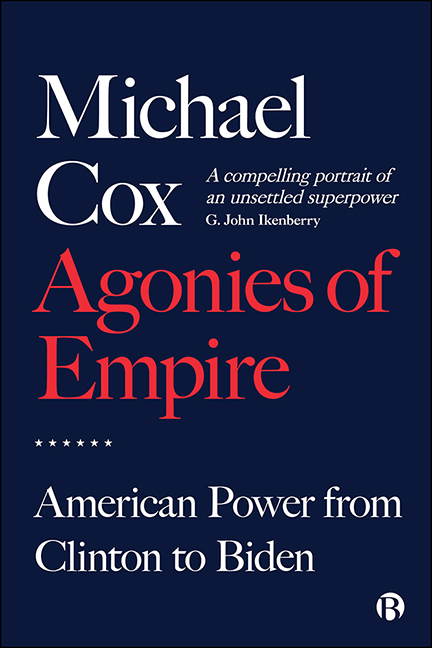Book contents
- Frontmatter
- Dedication
- Contents
- About the Author
- Preface
- Introduction: The Rise of an Empire
- PART I Clinton: Liberal Leviathan
- PART II Bush Jnr: Empire in an Age of Terror
- PART III Obama: Towards a Post-American World?
- PART IV Trump: Turbulence in the Age of Populism
- PART V Biden: Is America Back?
- Notes and References
- Acknowledgements
- Index
11 - After the Deluge or Whither the Empire?
Published online by Cambridge University Press: 15 September 2022
- Frontmatter
- Dedication
- Contents
- About the Author
- Preface
- Introduction: The Rise of an Empire
- PART I Clinton: Liberal Leviathan
- PART II Bush Jnr: Empire in an Age of Terror
- PART III Obama: Towards a Post-American World?
- PART IV Trump: Turbulence in the Age of Populism
- PART V Biden: Is America Back?
- Notes and References
- Acknowledgements
- Index
Summary
As we argued at the beginning of this volume, 30 years before Joe Biden became President of the United States, the international system stood on the cusp of something quite extraordinary and quite unexpected too: namely, a world in which America appeared to be facing neither serious opposition to its values nor to its power. As we indicated, there were several reasons why even the least sanguine American may have felt confident back then. The Soviet Union had just retreated from Eastern Europe. A year or two on, it collapsed. Then around the world, as socialism retreated in Europe, a number of leaders – even those who had once proclaimed the virtues of planning – began singing the praises of the market. Meantime, the term ‘globalization’, which was a concept that had hardly been used before 1990, began to gain traction among policy elites and would soon go on to define the new international economy of the post-Cold War era. One American writer even coined a term to describe this transition from one age marked by division and war to another where the liberal sun would forever shine: the ‘end of history’. We were not just witnessing the end of one bloody century, according to Fukuyama: a new door was opening through which we could glimpse a bright future in which liberal democracy would become the ideal to which every country would aspire. Even that least visionary of US presidents, George Bush Snr, sensed that something was in the air, and indeed was moved to announce in early 1991 the possibility of building a ‘new world order’ in which all the ‘nations of the world, East and West, North and South’ could ‘prosper and live in harmony’. The fact that Bush proclaimed his new order on the eve of a devastatingly successful military operation against Iraq led by Washington only confirmed what many now thought was self-evident: that there had never been anything quite so impressive as the United States in international affairs.
It is worth recalling all this if only to get some sense of how far the world has changed since those heady days when anything and everything seemed possible for the United States.
- Type
- Chapter
- Information
- Agonies of EmpireAmerican Power from Clinton to Biden, pp. 153 - 158Publisher: Bristol University PressPrint publication year: 2022

